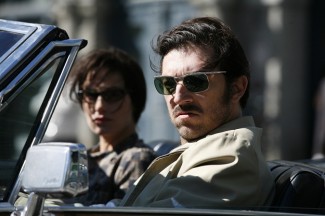Mesrine: Killer Instinct/Public Enemy No. 1 (2008, Jean-François Richet): France, Canada, Italy
Reviewed by Richard Feilden. Viewed at Ocean Avenue Screening Room, Santa Monica.
The opening moments of Mesrine: Killer Instinct filled me with dread. Multiple, split-screen perspectives had me wondering if director Jean-François Richet had turned the film’s protagonist, notorious real life gangster Jacques Mesrine, into a Thomas Crown-esque gentleman-criminal, or worse a comic book anti-hero. I need not have been concerned. I was not being set up for a fun filled heist romp. Rather, the fractured frame sets up the life of the man who is the focus of each shot. Though based upon Mesrine’s autobiography, this two-part film adaptation (part one is Killer Instinct, part two Public Enemy No. 1) refuses to glamorize its protagonist. Instead it paints a fascinating portrait of a psychopath with press-fuelled delusions of grandeur.
Though the films are ‘based upon’ the book that Mesrine himself wrote, it is made explicit from the opening moments that Richet and his co-writer Abdel Raouf Dafri (also responsible in part for last year’s dynamite A Prophet screenplay) have extrapolated, as the film opens with Mesrine’s death at the hands of the French police. It then quickly rewinds to the first episode in his life that we are to witness. Serving in the military in Algeria, he is commanded to execute a young woman in order to make her brother reveal the location of a bomb. He shoots the brother. Thus begins the films’ four hour episodic journey, from petty crime through cold blooded murder, towards his inevitable death.
Mesrine’s refusal to kill the girl sets up one of the many contradictions that he embodies. He won’t kill the Algerian woman, and later in the film he executes a pimp for beating a prostitute senseless, yet he forces a gun into his wife’s mouth during an argument, and assaults most of the women he’s seen with. His numerous prison breaks are intricate and well conceived, while an attempt to rescue others is farcical and doomed. His entire personality is tied up in the public’s perception of his anti-establishment deeds. He is contrary and compulsive, railing against captivity when he does far worse to others. Towards the end of his life, fuelled by his own press, he drapes himself in the catchphrases and ideology of a political movement that his cunning mind seems barely to understand, but whose colors he is sure will grant him greater press-allure. But the press is as contrary as Mesrine himself, and the attempted murder of a journalist whose articles don’t fall in line with Mesrine’s self image inevitably leads to a backlash and his demise.
Vincent Cassel is superb in the lead role. His Mesrine is brutal and savage, but with moments of utter charm. He is Robin-Hood as he thumbs his nose at the judiciary and, once he has been caught you find yourself willing him over the walls and through the barbed wire fences to freedom, just as the French public did when he ignited their imaginations. Yet within moments, Cassel turns him, seamlessly, into the snarling monster you knew needed caging from the start, and you fear for those around him. This is the film’s greatest strength in many ways. It never lets you get carried away for more than a moment in the criminals life before forcing you to stare at the beast within. We are complicit with the public who cheered him on, while those unfortunate enough to cross his path cowered before his rage. To glamorize Mesrine would have been a great mistake, and it is one that the film, even taken as it is from Mesrine’s own words, ably avoids.
The rest of the cast in both films ably support him, but special mention must go to Gérard Depardieu who dominates his scenes with a slickly-grim, intimidating presence as the crime-boss who takes Mesrine under his wing. Also worthy of praise is Richet and Dafri’s screenplay which, even at four hours with the two films combined, never drags. Mesrine’s episodic life sizzles from one caper to the next, the pace of the film matching his self-destructive path.
My only real concern is over the two part nature of Mesrine. While Killer Instinct and Public Enemy No. 1 chart separate arcs in his life, neither really makes sense without the other. I may often moan that films need their fat trimming, but this one fills its four-hour running time with ease. I hope that at least the choice to watch them in a ‘double-bill’ format will be offered. Your legs might fall asleep, but you certainly won’t.
In the interest of full disclosure, Mesrine: Killer Instinct and Mesrine: Public Enemy No. 1 were screened free for members of the press.
About this entry
You’re currently reading “Mesrine: Killer Instinct/Public Enemy No. 1 (2008, Jean-François Richet): France, Canada, Italy,” an entry on Student Film Reviews
- Published:
- 08.04.10 / 2pm
- Category:
- Films

No comments
Jump to comment form | comments rss [?] | trackback uri [?]